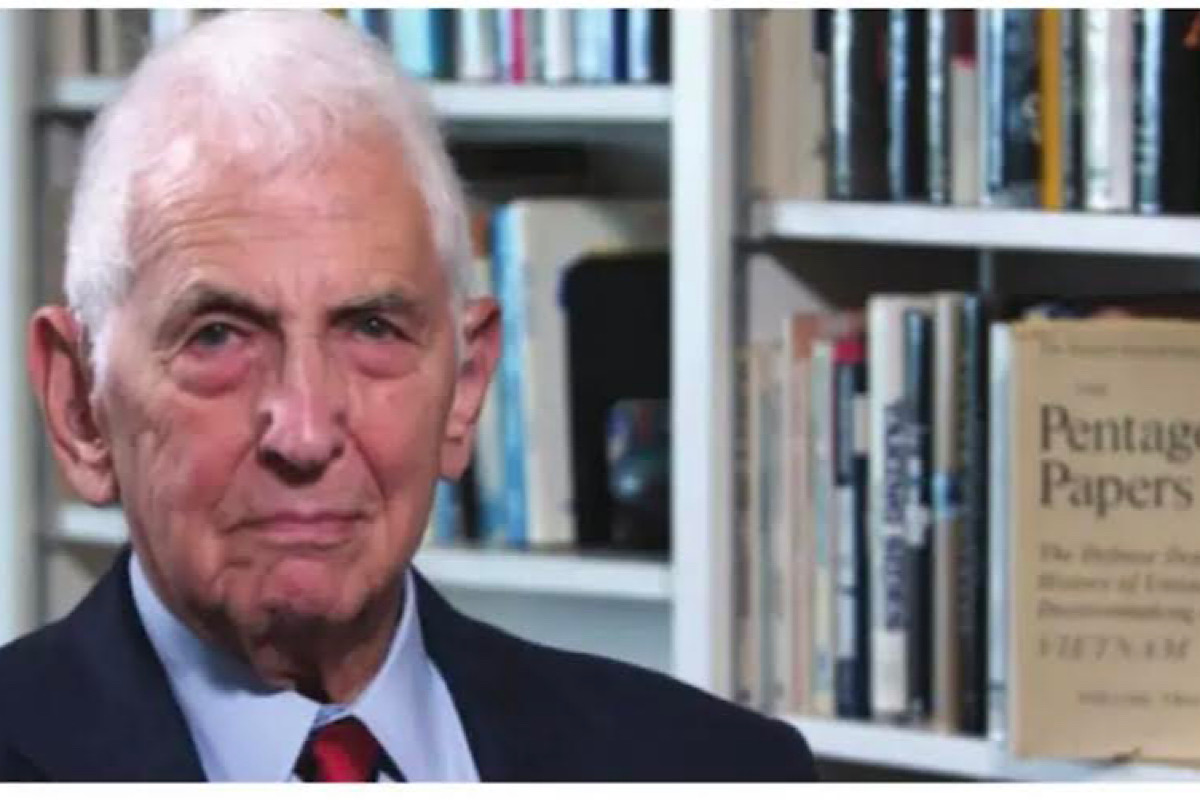Never will an outpour of grief squeeze past more tightly gritted teeth as during the formal appreciations of famed Pentagon Papers leaker Daniel Ellsberg, who died of pancreatic cancer on June 16. The US ‘establishment’ always loathed this former foreign policy official for his turncoat sins but was compelled to bestow faint praise on Ellsberg, who to them was at best a nuisance and, at worst, a reviled role model.
When the same savants who urge that Edward Snowden, Chelsea Manning or Julian Assange be jailed or even executed simultaneously say civil things about that trio’s staunchest defender, you should be on guard. Bob Dylan’s bitter lyrics come promptly to mind about encountering warm greetings from a sly foe who really would rather see you paralyzed or dead. In high policy circles one must be a team player no matter what crimes or follies colleagues are bent on, even if you swore an oath to the Constitution and not to a sleazy boss.
Advertisement
Career comes first. So, Ellsberg, ever since the 1970s carried a sulfurous aura about him, even among many mainstream Democrats, even if his perplexingly ethical antics eventually led to the downfall of Republican president Richard Nixon. Ellsberg was loathed especially for courageous acts that many disapproving colleagues knew deep down that they should have emulated. His release of the Pentagon Papers in 1971 spurred anti-war momentum enormously and proved what critics had been saying all along.
I was well aware of him from that moment forward, although, as we learned later, we both had been tear gassed during the 1971 Mayday demonstrations in Washington DC but in different areas of town. Dan soon emerged as a moral figure who never ever pretended to be holier than thou, which made him all the more attractive.
I finally met him in person in the early 2000s after I published a scathing review of a hatchet job biography of him which took the scurrilous line that only an egomaniac could have imagined, let alone, performed the act of delivering the 7,000 thousand page internal Defense Department study of the deceits behind the Vietnam War into public view. Stephen Spielberg’s 2017 movie The Post, an account of the Washington Post’s decision to publish the Pentagon Papers, also took the same snide view of Ellsberg, as if he were a minor pest, like Rosenkranz or Guildenstern, in the newspaper’s vaunted virtuous decision.
Lawyers at both the New York Times, which published the first tranche of the Papers, and Washington Post strongly advised against fooling (or, rather, unfooling) with them. At least on screen the 2009 Oscar-nominated documentary The Most Dangerous Man in America, as Henry Kissinger then characterized Ellsberg, provided Ellsberg’s first-hand account. In any case, a mutual friend passed my review of the hit job biography to Ellsberg who, apparently at a low moment then, responded warmly and we hit it off, including his consenting to a long and probing interview.
I never met anyone smarter. The US power structure was staffed with hordes of smart minions but no one is genuinely intelligent who cannot or will not question their own indoctrinations. It was stunning to hear Dan say of the Vietnam War at the time that the US wasn’t just on the wrong side, “we were the wrong side.” He helped redefine what patriotism is.
There was hope for a nation that can still produce sages of his calibre. At a dinner I attended a few years later another guest was novelist and National Book Award winner Larry Heinemann, a Vietnam combat veteran – exactly the sort of person rightwingers claimed that Ellsberg had endangered – who instantly held out a hand to Ellsberg, declaring, “A great and brave thing you did, sir.” Later still, Dan sent me, apparently just for the heck of it, a riveting chapter of his dicier derring-do adventures in mid1960s Saigon, which was excluded from his superb memoir Secrets.
Perhaps an enterprising relative will unearth and publish those excerpts, which have the makings of a very dark Indiana Jones spree. Then Ellsberg generously took time to read a volume by Sayeed Hasan Khan and myself on the misbegotten War on Terror and scribbled an endorsement, which felt like a bestowal of a mighty blessing.
Of course, during the Pentagon Papers tempest, Ellsberg made powerful enemies who wound up in jail themselves, almost as if in the unfurling of a karmic fairy tale, while Ellsberg wriggled free, if hardly unscathed. Dan would go on to be arrested on many occasions at peace and anti-nuclear protests as the years went on. Patriot Act era America, Dan sadly conceded, legalized many illicit state activities he had exposed.
He tirelessly warned Americans that their leaders are no less callous than those elsewhere, that the US is unapologetically if coyly an imperial power and, lately, that “Russia is the enemy we could not run the world without.” Putin’s Ukraine invasion, he argued, was reprehensible but US/NATO remorselessly provoked it. His 2017 book
The Doomsday Machine, urgently addressed our insidious complacency regarding the percolating threat of nuclear war. Dan, however cloying it must sound, was inspirational. After his cancer diagnosis, and given a few months, he was flooded with loving accolades from true friends. Dan made a difference and those who survive him won’t forget his gritty example even as we miss his radiant sanity .
(The writer is the author, with the late Sayeed Hasan Khan, of No Clean Hands, Parables of Permanent War and of many other books)
